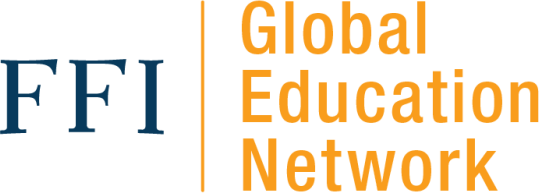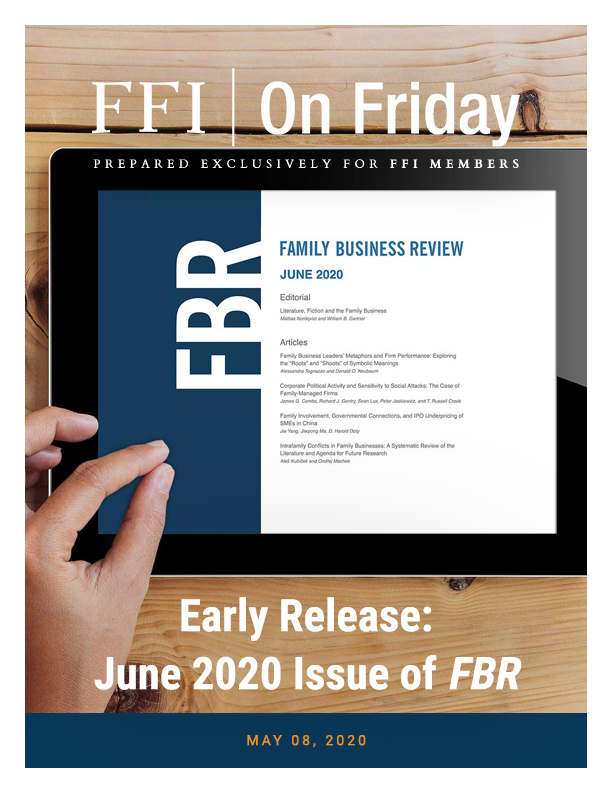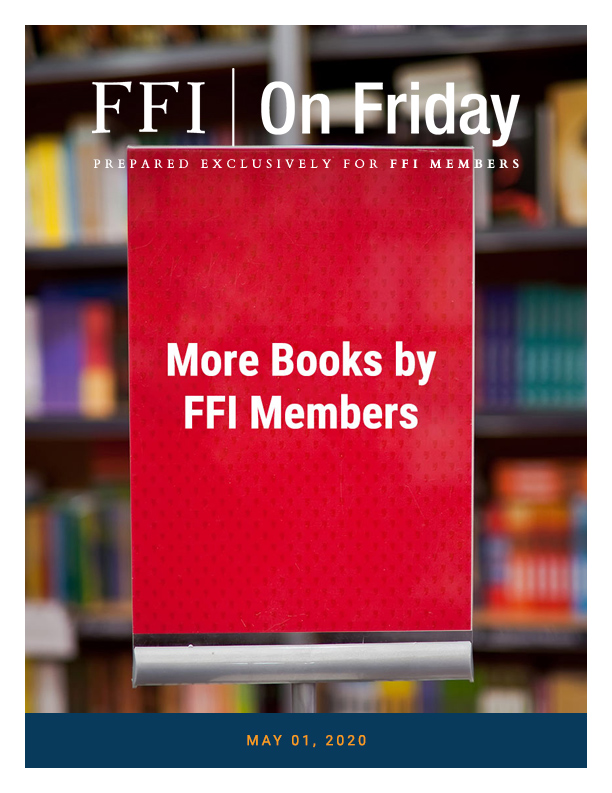Prepared Exclusively for FFI Members
Early Release: June 2020 Issue of FBR
May 08, 2020
W
e are pleased to provide you with an advance look at the June 2020 issue of Family Business Review (FBR).
As an FFI member, you have access to the complete library of FBR articles at no charge.
To access back issues of FBR, follow these instructions:
- Log in to your FFI member account
- Then click: my.ffi.org/page/family-business-review
- Click the link on this page to go to Family Business Review and you will automatically be redirected and logged in to FBR to begin reading.
EDITORIAL
Literature, Fiction and the Family Business
Mattias Nordqvist and William B. Gartner
Mattias Nordqvist and William B. Gartner
The authors discuss literature and literary studies as valuable perspectives to apply to family business research. In particular, literary fiction can help in describing important concepts that may be difficult to access through more traditional forms of data, and fiction can help researchers better account for the role of human experiences and priorities that guide decision-making and the everyday life of family businesses.
Mattias Nordqvist
Stockholm School of Economics
Stockholm School of Economics
William B. Gartner
Babson College
Linnaeus University
Babson College
Linnaeus University
Articles
Family Business Leaders’ Metaphors and Firm Performance: Exploring the “Roots” and “Shoots” of Symbolic Meanings
Alessandra Tognazzo and Donald O. Neubaum
Alessandra Tognazzo and Donald O. Neubaum
Research Questions
- How and why is family firms’ performance related to family leaders’ metaphorical interpretations of their organizations?
- What root metaphors do family leaders use to represent and interpret their family firms, and how do these root metaphors give symbolic meanings to their reality?
- What are the processes and mechanisms which link a family firm leader’s root metaphors of their firms and their firm’s subsequent behaviors, outcomes, and performance?
Implications for Practice
- The way in which family leaders manage their firms’ relationships and innovation practices appear to be related to paternal and maternal beliefs and values, which emerged as prevalent in family business leaders’ view of their firms.
- In family firms, a balance between the paternal and maternal symbolic pillars was associated with higher performance.
- Metaphors and images can be used by practitioners to help family businesses members discuss and understand their firms in ways that other methods, such as interviews or surveys, might not reveal.
- Conflicting and/or complementary thoughts, desires, emotions, and perceptions of the family and/or the firm within the business family might be diagnosed through the use of metaphors and images.
Alessandra Tognazzo
University of Padova
University of Padova
Donald O. Neubaum
Florida Atlantic University
Florida Atlantic University
Corporate Political Activity and Sensitivity to Social Attacks: The Case of Family-Managed Firms
James G. Combs, Richard J. Gentry, Sean Lux, Peter Jaskiewicz, and T. Russell Crook
James G. Combs, Richard J. Gentry, Sean Lux, Peter Jaskiewicz, and T. Russell Crook
Research Questions
- Do family-managed and non-family firms in the U.S. (and similar contexts) differ with respect to their corporate political activities?
- Does fear of social movements and social attacks affect whether family-managed firms differ with respect to their corporate political activities?
- Do family-managed firms that engage in various forms of corporate social activities differ with respect to their corporate political activities?
Implications for Practice
- Sensitivity to social attack keeps most large family-managed firms away from politics.
- When firms are industry incumbents, they are larger targets for social movements, so engaging in corporate political activity can act as ‘insurance’ should social movements stir up trouble.
James G. Combs
University of Central Florida
University of Ottawa
University of Central Florida
University of Ottawa
Richard J. Gentry
University of Mississippi
University of Mississippi
Sean Lux
Texas Tech University
Texas Tech University
Peter Jaskiewicz
University of Ottawa
University of Ottawa
T. Russell Crook
University of Tennessee
University of Tennessee
Family Involvement, Governmental Connections, and IPO Underpricing of SMEs in China
Jie Yang, Jieqiong Ma, and D. Harold Doty
Jie Yang, Jieqiong Ma, and D. Harold Doty
Research Questions
- How can institutional forces influence family firms’ IPO strategy in developing economies?
- Whether and how is IPO underpricing in Chinese family firms different from their counterparts in the developed countries?
- How do family firms’ governmental connections, such as state ownership and political ties, influence their IPO strategy in China?
Implications for Practice
- Underwriters and regulators in emerging economies should understand the impact of IPO firms’ family involvement and political ties on their IPO application process.
- Chinese investors can benefit from the knowledge about the IPO firms’ ownership structure, and the political background of the IPO firms’ top management team.
Jie Yang
University of Texas at Tyler
University of Texas at Tyler
Jieqiong Ma
Hofstra University
Hofstra University
D. Harold Doty
University of Texas at Tyler
University of Texas at Tyler
Intrafamily Conflicts in Family Businesses: A Systematic Review of the Literature and Agenda for Future Research
Aleš Kubíček and Ondřej Machek
Aleš Kubíček and Ondřej Machek
Research Questions
- What is the nature of intrafamily conflict in family firms and how can it be resolved?
- What are the major drivers of intrafamily conflict in family firms?
- What are the major effects of intrafamily conflict in family firms?
- What are the major research gaps?
Implications for Practice
- Business families should understand that conflicts may also have positive effects on the family firm, but caution has to be made regarding their form and contents; task conflict should not be confounded with relationship conflict.
- The ways or mechanisms of conflict resolution should be set appropriately with respect to conflict nature; for instance, relationship conflicts are not to be resolved using corporate governance mechanisms.
Aleš Kubíček
University of Economics, Prague
University of Economics, Prague
Ondřej Machek
University of Economics, Prague
University of Economics, Prague

May 11
The Role of Governance: Case Studies Using the Multi-Roles Model
Presenters: FFI Fellows Paul Karofsky and David Karofsky.
Paul is also a founding member of the 2086 Society
Paul is also a founding member of the 2086 Society
May 18
The Power and Limitations of Natural Governance
Presenter: FFI Fellow Ken McCracken
May 25
Changing Demographics in Family Businesses: Highlights from the STEP 2019 Quantitative Survey
Presenter: Andrea Calabrò is the global academic director of the STEP Project

Working remotely? If like so many others, you are getting used to working virtually, this is a great time to enroll in the FFI GEN program.















